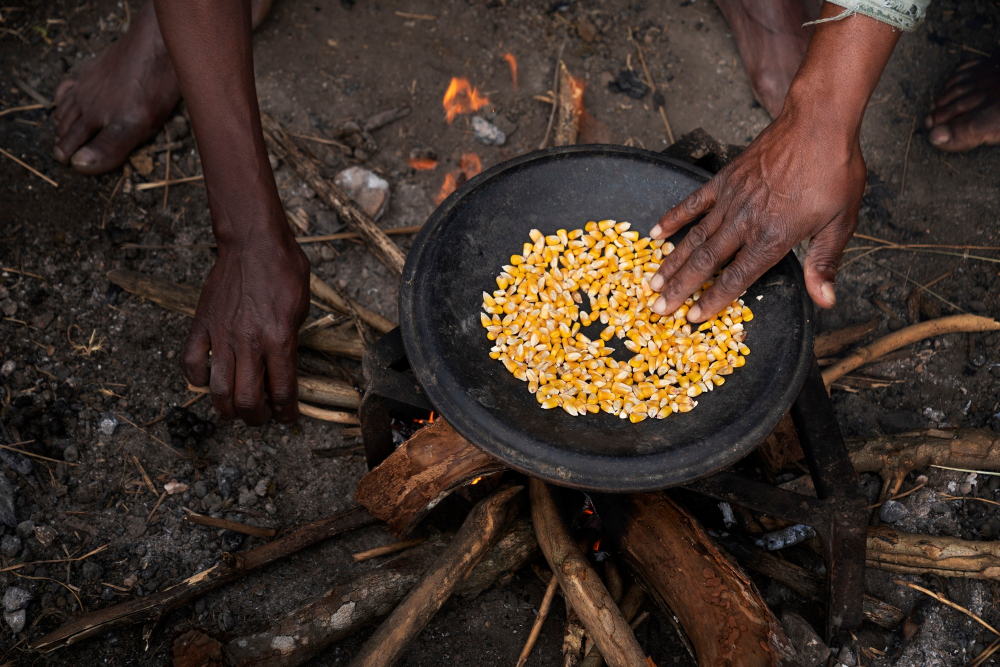🎧 Listen to: Malnutrition

Malnutrition
What is malnutrition?
Malnutrition happens when the body doesn’t get the right balance of nutrients. This can mean getting too little or too much of certain nutrients, leading to serious health problems. In Africa, malnutrition is a major issue, especially among children and pregnant women. According to the world health organization (WHO), about 45% of deaths among children under five in Africa are linked to malnutrition.
Malnutrition can take different forms:
- Undernutrition: When the body lacks important nutrients, leading to stunted growth, low weight, and weakness.
- Overnutrition: When the body gets too much of unhealthy foods, leading to obesity and related diseases like diabetes and high blood pressure.
How common is malnutrition in Africa?
- Stunted growth: Around 30% of children in sub-Saharan Africa suffer from stunting, meaning they are too short for their age due to long-term malnutrition.
- Underweight: More than 10 million African children are underweight, making them vulnerable to diseases.
- Obesity rising: Urban areas are seeing an increase in obesity due to high consumption of processed foods and lack of exercise.
- Vitamin deficiencies: Many Africans suffer from lack of vitamins such as vitamin A, iron, and iodine, leading to poor eyesight, fatigue, and brain development issues.
Types of malnutrition?
Undernutrition
This happens when the body doesn’t get enough food or lacks key nutrients. Signs include extreme thinness, weakness, and slow growth.
Common conditions caused by undernutrition:
- Kwashiorkor: Caused by severe lack of protein. It makes the stomach appear swollen and the skin dry and flaky.
- Marasmus: Caused by extreme lack of calories, leading to severe weight loss and weakness.
- Vitamin A deficiency: Leads to night blindness and increases risk of infections.
- Zinc deficiency: Causes slow growth, weak immune system, and loss of appetite.
- Iron deficiency: Causes constant tiredness, pale skin, and difficulty concentrating.
- Iodine deficiency: Leads to goiter (swollen thyroid gland) and brain development issues. Overnutrition
Overnutrition occurs when people consume too many unhealthy foods, leading to weight gain and diseases. In African cities, fast food, sugary drinks, and lack of exercise have increased obesity rates.
Effects of overnutrition include:
- Obesity: Increases risk of diabetes, high blood pressure, and heart disease.
- Diabetes: High sugar intake can cause diabetes, leading to kidney and heart problems.
- Heart disease: Too much fat and salt in the diet can lead to high blood pressure and strokes.
Causes of malnutrition?
- Poverty & food insecurity: Many families in Africa cannot afford a balanced diet.
- Diseases & poor health: Conditions like diarrhea prevent proper nutrient absorption.
- Lack of nutrition awareness: Many people do not know what a healthy diet looks like.
- Alcohol consumption: Excessive drinking can prevent the body from using nutrients properly.
- Mental health issues: Depression and stress can lead to loss of appetite and poor eating habits.
How to prevent and treat malnutrition?
Prevention
- Eating a balanced diet rich in vegetables, fruits, proteins, and whole grains.
- Giving pregnant women and children vitamin supplements like Iron, Zinc, and Vitamin A.
- Encouraging exclusive breastfeeding for the first six months of a baby’s life.
- Educating communities on healthy food choices and exercise.
Treatment
Encouraging governments and NGOs to invest in food security programs.
Providing nutrient-rich foods to malnourished children and adults.
Using vitamin and mineral supplements like iron and iodine pills.
Seeking medical advice for severe cases (e.g., hospital treatment for kwashiorkor and marasmus).
